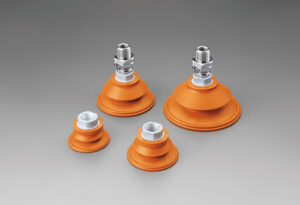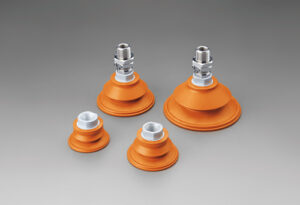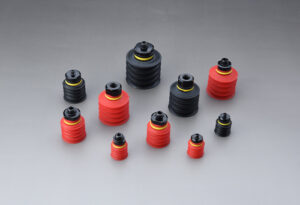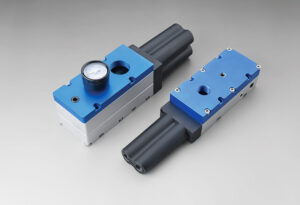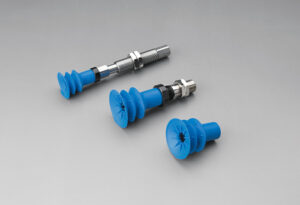Introduction
Vacuum suction cups are crucial in material handling and automation processes in various industries. These devices rely on suction and vacuum pressure principles to securely grip and manipulate objects of different shapes, sizes, and surfaces. Significant advancements in material science have been made to enhance their performance, resulting in more robust and durable vacuum suction cups. This article aims to explore the latest developments in material science and how they have revolutionized the capabilities of vacuum suction cups.

Understanding Vacuum Suction Cups
Before delving into material advancements, it’s essential to have a basic understanding of vacuum suction cups and their applications. These cups are typically made of specialized materials that provide flexibility, sealing properties, and resilience. They are designed to create an airtight seal between the cup and the object’s surface, creating a vacuum and generating suction force. This suction force lets the cups grip objects securely, facilitating their movement, lifting, and placement.
Evolution of Material Science in Vacuum Suction Cups
Traditional vacuum suction cups were primarily made from materials such as rubber or PVC. While these materials served their purpose, they had limitations regarding durability, flexibility, and adaptability to different surfaces. However, recent advancements in material science have led to new materials engineered explicitly for vacuum suction cups.
Innovative Material Technologies
The advancements in material science have paved the way for introducing innovative materials that have significantly enhanced the performance of vacuum suction cups. Some of the notable material technologies include:
Silicone-based Materials
Due to their exceptional properties, silicone-based materials have gained popularity in the development of vacuum suction cups. Silicone offers excellent elasticity, high-temperature resistance, and remarkable durability. These qualities make silicone suction cups ideal for handling delicate and fragile objects, providing a gentle yet secure grip. Additionally, silicone-based materials exhibit good chemical resistance, ensuring their suitability for various industrial environments.
Composite Materials
Composite materials, which combine different substances to create new materials with enhanced characteristics, have also made their way into the realm of vacuum suction cups. These composites often combine elastomers, plastics, and reinforcing agents such as fibers or particles. By blending these materials, suction cups can exhibit improved strength, increased load-bearing capacity, and enhanced resistance to wear and tear.
Elastomers and Specialized Polymers
Elastomers and specialized polymers designed explicitly for vacuum suction cups have improved their performance. These materials offer excellent flexibility, allowing the suction cups to conform to irregular or uneven surfaces. Elastomers also provide superior sealing capabilities, ensuring a tight grip between the cup and the object’s surface. Furthermore, these materials can withstand repeated use without compromising integrity, resulting in longer-lasting suction cups.
Integrating these innovative material technologies has transformed vacuum suction cups into highly efficient and reliable components for various industrial applications. These advancements have addressed previous limitations and opened doors to new possibilities in material handling and automation processes.
Applications and Benefits of Advanced Materials
The advancements in material science have brought significant benefits to the performance of vacuum suction cups, making them highly valuable in a wide range of applications. Some critical applications and benefits include:
Industrial Automation and Robotics
In industries where automation and robotics play a vital role, vacuum suction cups with advanced materials offer improved gripping capabilities and enhanced reliability. These cups enable precise handling of objects, allowing for efficient assembly, packaging, and sorting processes. Advanced materials ensure that the suction cups can withstand demanding operational conditions, leading to increased productivity and reduced downtime.
Handling Delicate and Fragile Objects
Vacuum suction cups with specialized materials, such as silicone-based compounds, are particularly suitable for handling delicate and fragile objects. These cups provide a soft and gentle grip, minimizing the risk of damage or deformation. Industries like electronics, glassware, and food packaging benefit greatly from using such suction cups, as they allow for the safe and secure handling of sensitive items.
High-Temperature Environments
In applications involving high-temperature environments, suction cups with advanced materials that exhibit excellent heat resistance are essential. These cups can withstand elevated temperatures without compromising grip performance or structural integrity. Industries such as metalworking, automotive, and aerospace benefit from using high-temperature resistant suction cups, enabling efficient handling of hot objects during manufacturing.
.
Harsh Chemical Environments
Specific industries, such as chemical processing or pharmaceuticals, require suction cups that can withstand exposure to aggressive chemicals. Vacuum suction cups made from chemically resistant materials can maintain their performance and integrity even when exposed to corrosive substances. This ensures a reliable grip and longevity in challenging environments, minimizing the risk of failure or contamination.
By considering the specific requirements of different industries and applications, users can select vacuum suction cups with advanced materials that best suit their needs. Consulting with manufacturers or suppliers specializing in vacuum cups and accessories can provide valuable insights and guidance in choosing the most suitable options.
Conclusion
Material science advancements have revolutionized vacuum suction cups’ performance, making them more robust, durable, and versatile in various industries. The introduction of innovative materials, such as silicone-based compounds, composite materials, elastomers, and specialized polymers, has significantly enhanced vacuum suction cups’ gripping capabilities and overall reliability.
These material advancements have enabled vacuum suction cups to excel in applications ranging from industrial automation and robotics to handling delicate and fragile objects. The ability of suction cups to withstand high temperatures and harsh chemical environments has expanded their utility in challenging operational conditions.
When selecting vacuum suction cups, it is crucial to consider the specific requirements of the intended application. Manufacturers and suppliers specializing in vacuum cups and accessories can provide valuable guidance in choosing the most suitable materials for different industries and environments.
With ongoing research and development in material science, we can anticipate further advancements in vacuum suction cup technology. Future innovations may lead to more resilient materials, improved gripping capabilities, and enhanced performance in diverse applications.
In conclusion, the continuous advancements in material science have propelled vacuum suction cups to new heights, enabling efficient and reliable material handling processes across industries.



